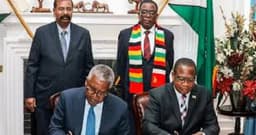
The U.S., U.K., Australia and Canada, long considered the “Big Four” destinations for international students, are steadily losing their dominance as visa rules tighten and new education hubs rise across Asia and the Middle East.
Recent data show dramatic declines in international enrollment in the traditional hubs: Canada has seen a 60% drop in incoming students this year, the steepest since the pandemic, while the U.S. and Australia's both fell by nearly 20%. Only the U.K. managed to hold relatively steady.
Before Covid-19, students from major markets like China and India overwhelmingly chose one of these four countries. But that picture has changed. According to a joint report by Studyportals and the British Council analyzing 51 million prospective students, demand for study abroad in Japan and China has surged, while Malaysia and India also show strong growth.
"The global market for academic talent is as dynamic and complex as it has ever been," said Edwin van Rest, CEO and co-founder of Studyportals, as cited in the report. "International students have proven to be of broad and unique contribution to their host countries, and some upcoming destinations are effectively making use of the current market situation to advance talent attraction."
In the same report, Fanta Aw, CEO of NAFSA - Association of International Educators, added, "Amid sweeping political shifts in the U.S., this survey offers a powerful snapshot... The message is unmistakable: international students are paying attention and increasingly turning away from the traditional ‘Big Four’ destinations in search of stability, opportunity, and affordability. It is really about the ‘Big Ten’ now."
Experts say Asia and the Middle East–North Africa are not only keeping more of their local students, but also attracting learners from abroad, a sign of a broader realignment in global higher education.
Tightened visa and immigration rules have accelerated that shift. Australia and Canada have capped foreign-student numbers, the U.K. now bans most master’s students from bringing dependents, and the U.S. has added stricter visa checks, including social media reviews.
Rising tuition and living costs in the West have only pushed more students toward culturally familiar and affordable options closer to home.
Among the fastest-rising markets is Hong Kong, where up to half of non-local students can receive government subsidies. Investment in higher education has also boosted universities there in global rankings. Other ascendant destinations include Ireland, South Korea, Malaysia, New Zealand, Singapore, the UAE and Vietnam.
Governments across Asia are setting bold targets: India aims for 500,000 international students by 2047, Japan plans for 400,000 by 2033, and South Korea already reached 300,000, two years ahead of schedule.
In Southeast Asia, countries like Indonesia, the Philippines and Vietnam are no longer just partners for foreign universities but are becoming study destinations in their own right, education consultant Melissa Banks of The Lygon Group said, Pie News reported.
The Middle East is also betting big on education internationalization. The UAE, Saudi Arabia and Qatar are expanding branch campuses and scholarships, with Turkey and the UAE currently attracting the most foreign students in the region, according to University World News.
Europe, too, remains competitive. About 30% of Chinese students are considering France and nearly 20% are looking at Germany, both seen as more welcoming, with strong job prospects and nearly free tuition, per IDP data cited by Insider Higher Ed.
Fanta Aw noted that many of the new institutions in Asia and the Middle East were founded by people who once studied in the U.S. and later returned home to build capacity locally, "part of what education is about," Inside Higher Ed reported.
Officials in Australia and Canada say the diversification trend should be welcomed, not feared. Julian Hill, Australia’s assistant minister for international education, and Larissa Bezo, CEO of the Canadian Bureau for International Education, have both called it an opportunity for collaboration rather than competition, Pie News reported.
Phil Honeywood, CEO of the International Education Association of Australia, agreed, saying Australia already has strong partnerships abroad, and that this moment could help the country "become part of the development of new global education hubs, rather than compete against them," Pie News reported. (VN Express)



























NEWS EXPRESS is Nigeria’s leading online newspaper. Published by Africa’s international award-winning journalist, Mr. Isaac Umunna, NEWS EXPRESS is Nigeria’s first truly professional online daily newspaper. It is published from Lagos, Nigeria’s economic and media hub, and has a provision for occasional special print editions. Thanks to our vast network of sources and dedicated team of professional journalists and contributors spread across Nigeria and overseas, NEWS EXPRESS has become synonymous with newsbreaks and exclusive stories from around the world.